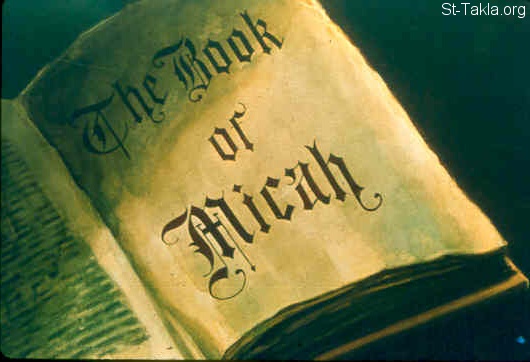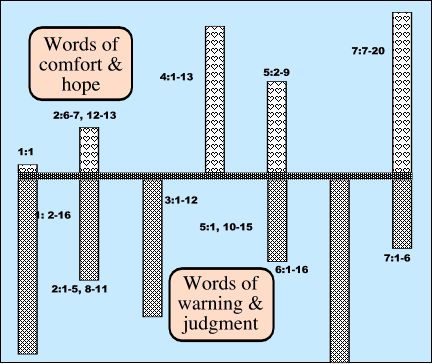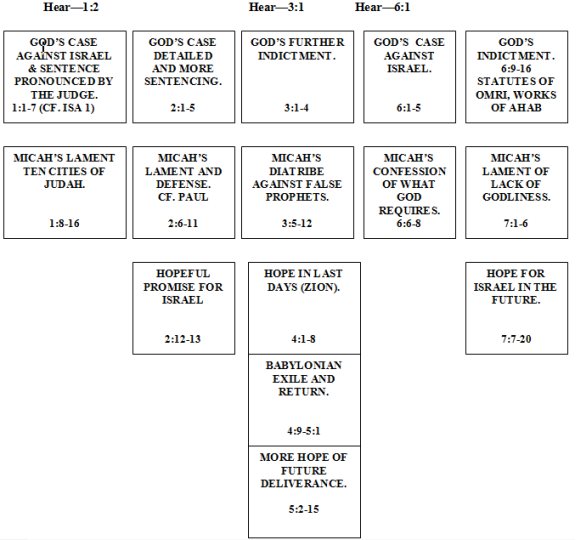Book of Micah
- Isaiah
- Jeremiah
- Lamentations
- Baruch including letter of Jeremiah
- Ezekiel (Ezekiel )
- Book of Daniel ( accessories)
- Hosea
- Joel
- Amos
- Obadiah
- Jonah
- Micha
- Nahum
- Habakkuk
- Zephaniah
- Haggai
- Zechariah
- Malachi
The book of the prophet Micah is one of the prophetic books of the Tanakh. It is one of the Twelve Prophets.
Author and time
Micah Moresheth (Micah 1 EU, Jeremiah 26,18 EU). In the Greek translation of the Bible ( LXX ) is the name of the form Michaias. This suggests that the name Micha not as a short form of Michael, but of Micaiah ( " Who is like Yahweh ?") Should be interpreted.
He received his revelations by Micha 1.1 during the reign of Kings Jotham ( 757-736 BC ), Ahaz ( 735-725 BC ), and Hezekiah ( 725-697 BC ) of Judah.
"His speech, which Micah the Moreschetiter happened in the days of Jotham, Ahaz ', Chiskijas, kings of Judah, which he received on Samaria and Jerusalem. "
So he was a contemporary of Isaiah, Amos and Hosea. With Moresheth (Micah 1.1 and Jeremiah 26,18 EU ) is probably meant the village near Gat in the Judean Schefala.
Verses 1:1-8 EU are likely to be incurred prior to the destruction of Samaria by Sargon of Assyria (722 BC), verses from 1.9 to 16 EU before the invasion of Sennacherib of Assyria (701 BC)
Topic
Micah charges against social injustice and religious depravity render the issue of Amos and his contemporaries revive. Although he was considered a prophet, he avoided this title because he wanted to strongly differentiated from the professional prophets. His prophecies complain especially the poor social position of small farmers and citizens who were oppressed by the state and its bureaucratic apparatus to ensure its maintenance.
In the book of Jeremiah is testified that Micah's word was heard and helped his message on the reform of Hezekiah has (Jeremiah 26:18 ff), and Micah's prophecy and its effect is used as an argument to prevent that Jeremiah is executed for a similar prophecy. Some scholars assume a retrospective editorial of his book. Others assume that Micah has written the book itself.
Challenge for the boom
Linguistic similarity
The linguistic similarity between Micah 4:1-3 and Isaiah 2:2-4 raises the question of who killed whom quoted here. The cantilevers have different views, without clear answers on both sides. Since the two prophets in close proximity to each other lived and prophesied at the same time, this similarity is evident.
Announcement of an Anointed
The Prophesied in Micah 5:2 is partly as the announced in Isaiah 7:14:
(...) Behold, a virgin shall conceive, and bear a son, and shall call his name Immanuel.
And in Isaiah 8.3 released son of Isaiah viewed:
And I unto the prophetess, and she conceived and bore a son. And the LORD said to me, Call his name: "Soon comes looting, robbery quickly !"
However, Christian sources refer Micah 5:2 on the birth of Jesus.
Content
1 title ( Mi 1.1 EU)
Second court (Mi 1.2 EU-3, EU 12 ) concerning Samaria and Jerusalem ( from 1.2 to 16 EU) about the greedy rich ( 2:1-11 EU) Promise of the Savior ( 2:12-13 EU) Court of violent princes, false prophets, greedy priest ( 3:1-12 EU)
3 The future salvation ( Mi 4.1 EU -5, EU 14 ) The Mountain of the Lord in the Kingdom of Peace ( 4:1-8 EU) Babylonian Captivity and Restoration ( 4.9 to 14 EU) Coming of the Saviour ( 5.1 to 14 EU)
4 The Lord pleads with Israel (Mi 6.1 EU -7, EU 20 ) The requirement of God ( 6:1-8 EU) Sins of Jerusalem and God's punishment ( from 6.9 to 16 EU) Consequences of sin: Destruction of each community ( 7:1-6 EU) Hope and God's help ( from 7.7 to 17 EU) Praise the mercy of God ( 7:18-20 EU)
Important points
- Prophecy of the birth of the Anointed ( Messiah) in Bethlehem:
- Motto of the German Protestant Church Congress 1995
- Important Quote of the Christian resistance in the GDR
- Belegstelle the chiliastic interpretation of the text of the 18th century










